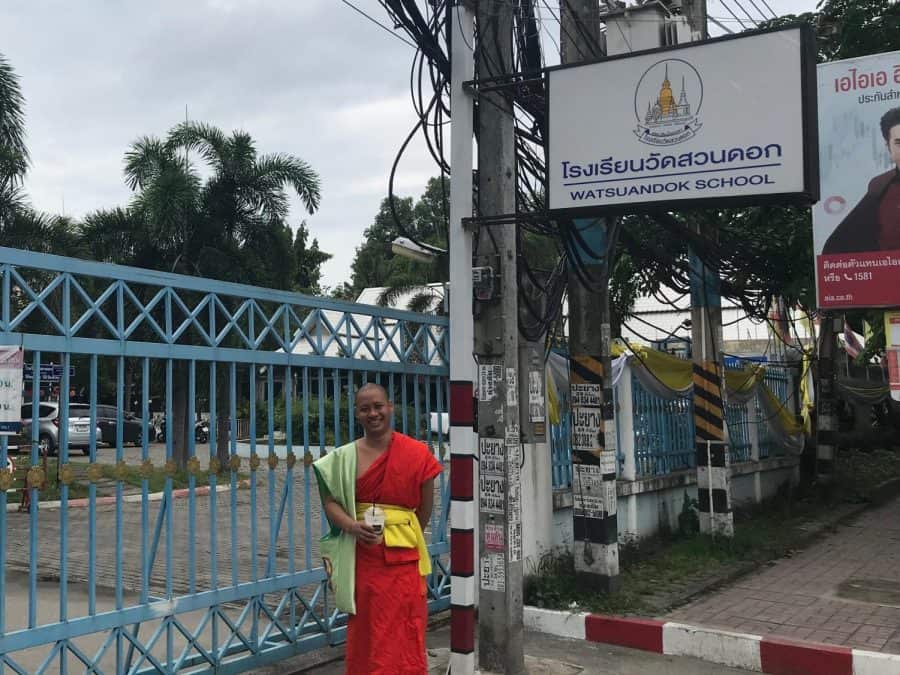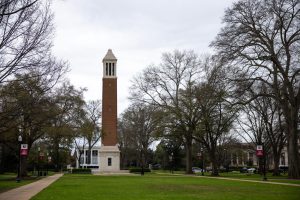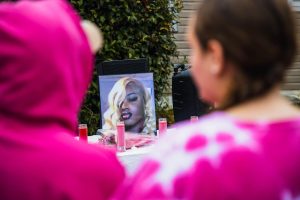Dispatches From Abroad: University as a Buddhist Monk
December 4, 2019
It brings me no shame to admit that I have struggled to get to some morning classes on time and in my best form. However, I would never complain about an 8 a.m. class to a monk in Chiang Mai, Thailand’s Suan Dok Temple. There, a bell rings at 5 a.m. every morning.
It is 24-year-old Ae Munee, from a Karean hill tribe in Thailand’s northwestern Tak province, who rings the bell to start the students’ day. He spent his first six years in the temple as a monk novice and his past four as an ordained monk. In his fourth and final year of university, he serves in a leadership role to the younger undergraduates.
A typical day for Munee:
5 a.m. wake up, bell for morning chant, meditation
6 a.m. clean temple
6:40 a.m. take donation bowl around city
8:30 a.m. morning classes begin
11 a.m. lunch (according to monk precept, no eating allowed after 12 p.m.)
12 p.m. afternoon classes begin
6 p.m. bell for evening chant
6:40 p.m. meditation and focus
10:30 p.m. typical bedtime
I met Munee and many other students in a couple of their English language classes, where some American and Mexican friends and I helped teach. We would have them take turns answering a general question written on the board and broke into small groups for conversation. In class, they broke from the stoicism I was used to seeing from monks in public. They kept the mood light, cracking jokes with each other and asking us questions about our lives in our home countries.
When he graduates after next Spring, Munee said he plans to “disrobe,” meaning he will no longer live the monastic life. He says he may become a server or tour guide so as to engage with foreigners and speak English, and he plans to donate back to his high school and the temple. He also looks forward to playing soccer and takraw, or “kick volleyball,” again.
Monks follow 227 precepts to emulate the life of Siddartha Gautama or “the Buddha,” whose teachings founded Buddhism. Munee said the basic four forbid from taking any life (human or otherwise), stealing, having power and speaking ill. Others include abstaining from sports, singing or dancing, drinking alcohol, or physically touching a woman. Only males can traditionally become monks in Thailand.
Overall, he said he appreciates the education and wisdom that the temple has given him. It has helped him develop as a teacher and volunteer, and he has found joy in the practice of sharing. He said he appreciates the simplicity of life there.
Crudely, I asked him if he knew the phrase, “Mo’ money, mo’ problems.”
“More like, ‘No money, no honey,’” he said with a laugh.
Some of the monks I met at Suan Dok – from Thailand, Laos, Tibet and elsewhere – had taken the robes at infant ages because their families could not support them. They may not renounce this commitment until they reach age 20.
Dr. Christopher Fisher, on the other hand, chose his path as a young adult monk student before either Munee or I was born. Now, he teaches medicine and Buddhist philosophy at Chiang Mai University and lives with his family just outside Chiang Mai.
Fisher said he first called himself a Buddhist at age 13 after reading much about the ideology behind it. He dropped out of college after one semester and decided to become a monk, both for spiritual reasons and because he “still needed structure.”
He did not expect to find himself picking his paramedic studies back up in China, but elder monks there insisted he pursue a career in science.
When he asked why, they responded, “Because how can you take any religious person seriously if they don’t have a degree in science?”
After he finished medical school, Fisher got a philosophy degree in Japan. Overall, he spent 14 years as a monk and 10 of those in a temple. He insisted that all along, he never considered Buddhism a religion, but he attributes his current lifestyle to existential answers he found in practicing its philosophy during that time.
“They showed me how to be happy,” he said. “I have been happy since I was 18 years old.”
The monk-turned-professor learned to act as his authentic self, rather than for what others expected of him. He describes his approach now as one “free of ego,” or without what he might have once had that caused anger or allowed him to feel offended.
He left the temple when he had learned as much as he “could possibly learn at that time” and wanted to pass what he had learned along to “help other people be happy.”
Neither Fisher nor Munee went out of their way to preach any of this about Buddhism to me. They only ever opened up to me once I asked, but then they did it with enthusiasm.
As Buddhists, they do not worship any god figure; they follow the Buddha’s teachings and emulate his way of living, which discourages imposing belief systems on others.
“The Buddha said, ‘If you want to know, you should practice by yourself. Don’t follow me,’” in Munee’s words.
In our conversations, I sensed deep serenity and centeredness within both of these men. After their experiences so different from what most of us will ever know, I wonder how much of this knowing they and their peers might have experienced.










